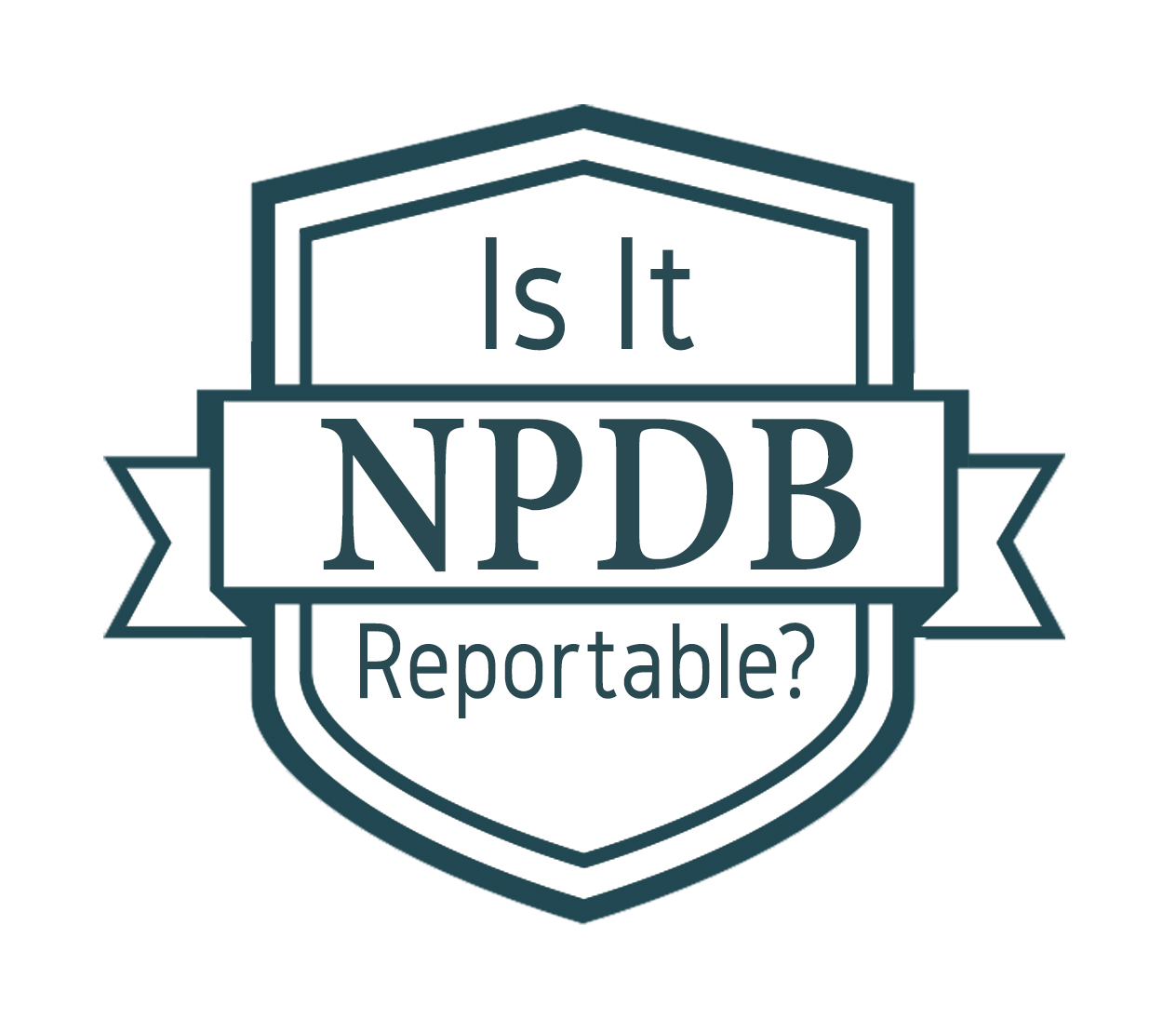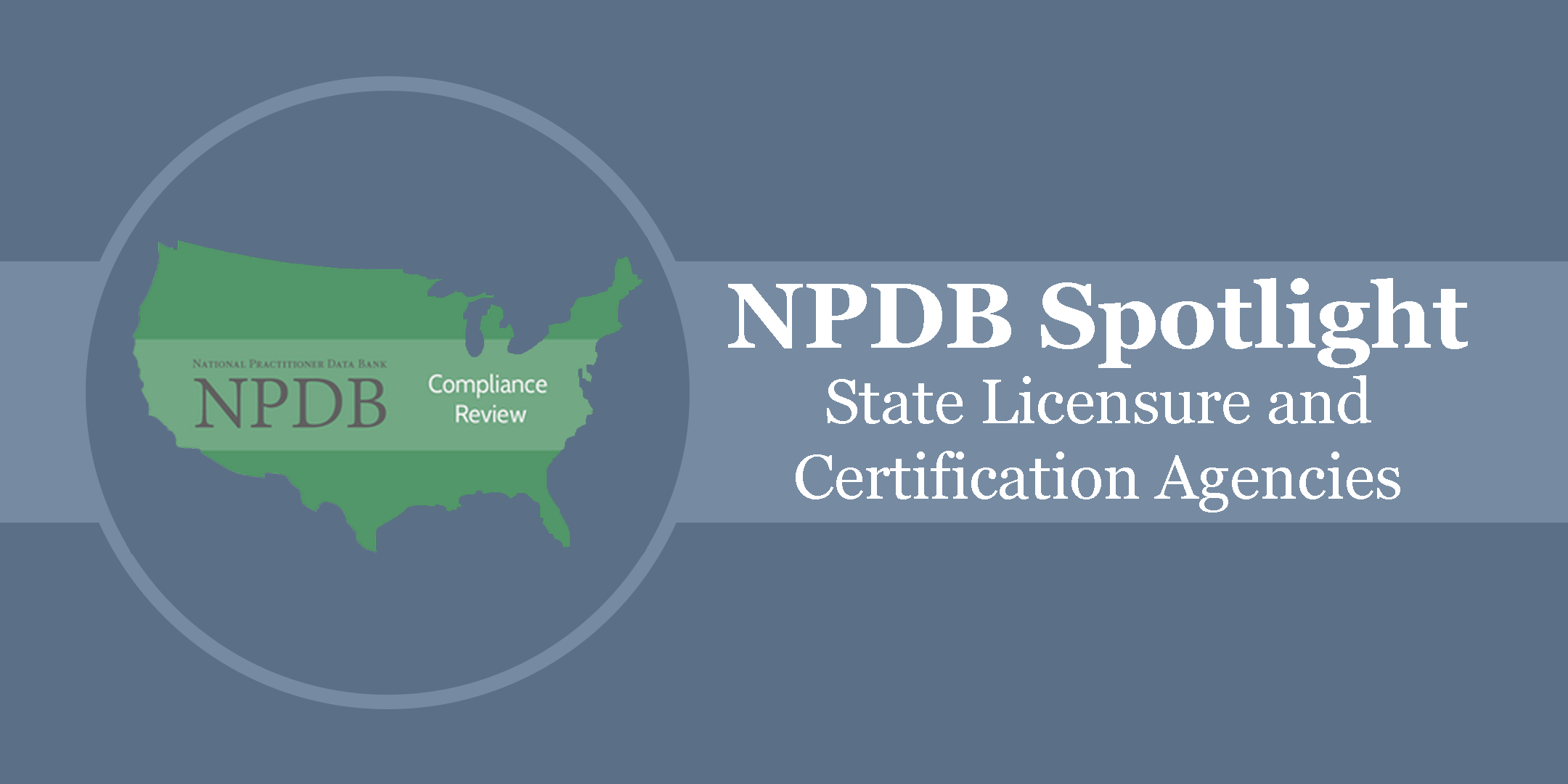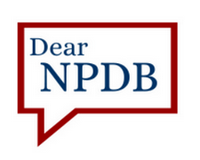NPDB Insights - November 2022
Clinical Privileges Reporting Scenarios Webinar Resources
The recording, Q&As, and presentation slides from our recent webinar are now available!
Did you miss any of our past webinars? Check out our Events page for past event materials.

Is It Reportable?
A hospital suspended a physician's clinical privileges for 45 days for failing to complete medical records. Should this action be reported to the NPDB?
If the suspension is the result of a professional review action and the hospital determines that the failure to complete medical records is related to the physician's professional competence or conduct and can adversely a patient's health or welfare, the suspension must be reported to the NPDB. If a practitioner's clinical privileges are suspended as a result of an automatic or administrative action, rather than a professional review action, the suspension should not be reported to the NPDB.

NPDB Spotlight: State Licensing and Certification Agencies
State licensing and certification agencies include, but are not limited to, any authority of a state that is responsible for the licensing or certification of physicians, dentists, and other health care practitioners to provide health care services. This includes state licensing boards and those bodies responsible for licensing, certifying, or otherwise authorizing health care practitioners, entities, providers, or suppliers.
Reporting
State licensing and certification agencies must report certain adverse actions taken against health care practitioners, entities, providers, or suppliers within 30 days of the date they took the action. Reported actions must be a result of formal proceedings. A formal proceeding is one that is conducted by a state licensing or certification agency that maintains defined rules, policies, or procedures.
Reporting is essential to the NPDB's mission to improve health care quality, protect the public, and reduce health care fraud and abuse in the United States. Organizations that fail to submit their required reports may be subject to the sanctions outlined in 45 CFR Part 60.8 and 45 CFR Part 60.9.
See Chapter E: Reports of the NPDB Guidebook for a comprehensive list of actions that state licensing and certification agencies must report.
Updating Your List of Regulated Professions
State licensing and certification agencies must review their organization's list of regulated professions every 2 years during their registration renewal. However, your account administrator can review and update the list at any time.
To access the current list:
- Sign into the administrator account and select Administrator Options.
- Then select Regulated Professions. From the Regulated Professions page, you can add or remove professions.
- To save changes, select the checkbox to confirm the list is correct.
- Then select Continue.
- Review the summary of your selections and select your option for report forwarding.
- Then select Submit.
Visit our State Licensing and Certification Agencies page for information on:
- How to add or remove a profession
- How to add an optional description (such as "intern" or "certified") to your profession
- How to select your regulated professions in a report
Attestation
Attestation is the NPDB's national education and outreach effort to ensure all organizations are registered with the NPDB and are meeting their reporting, querying, and confidentiality requirements. All state licensing and certification agencies must renew their registration every 2 years. During that time they are asked to review their reporting activity, and attest to their compliance with all NPDB regulations.
Compliance Reviews
The NPDB selects a subset of state licensing and certification agencies to participate in the NPDB compliance review process.
If we select your organization for a compliance review, we will notify you of any missing data, or missing reportable actions. We will ask you to reconcile missing actions by submitting reports, or explaining why certain actions are not reportable.
See our State Board Compliance Overview infographic for more information on compliance reviews.

What To Know About Reporting Proctoring
What is proctoring, and when is it reportable? It can have various names (such as preceptoring or monitoring), but whether you must report to the NPDB the assignment of a proctor depends on several factors. These include the type of proctoring and the length of time it is in effect.
When Is Proctoring Reportable?
Proctoring imposed by a health care entity should be reported as a clinical privileges action only if:
- It restricts a practitioner's privileges (see below for more details),
- It is the result of a professional review action which is related to professional competence or conduct, and
- It is in effect for more than 30 days.
What Is a Restriction of Practitioner Privileges?
A restriction is any action that limits a practitioner's ability to practice on their own. For example:
- A proctor must approve a procedure before the practitioner may perform it, or
- A proctor must be physically present when the practitioner provides care.
When Should You Not Report Proctoring?
The following are situations in which you should not report imposed proctoring as a clinical privileges action:
-
When it does not restrict the practitioner's privileges. For example:
- If the proctor is not required to approve a procedure before it occurs,
- If the proctor is not required to be present for a procedure, or
- If a proctor's involvement is solely in reviewing medical records after a procedure has already been performed.
-
When it is not a professional review action. For example:
- You proctor all new practitioners, or
- You proctor those who have not performed a specific number of procedures.
-
When it is in effect for 30 days or fewer.
- You should only report it if it is in effect for more than 30 days.
View Chapter E of the NPDB Guidebook for more information on proctoring. Still need help with reporting? Contact our Customer Service Center.

Dear NPDB
When am I required to cancel a Continuous Query enrollment?
You must cancel the enrollment when a practitioner is no longer employed by or affiliated with your organization. Prompt cancellation ensures you do not receive information you are not allowed by law to view.
Failure to cancel an enrollment is a violation of the confidentiality requirements and may result in penalties from the NPDB. The NPDB does not issue refunds for canceled enrollments.
Visit our how-to page for more instructions.
The latest updates and resources are available at https://www.npdb.hrsa.gov.
Previous editions of NPDB Insights are available in our archive.
 An official website of the United States government.
An official website of the United States government.

